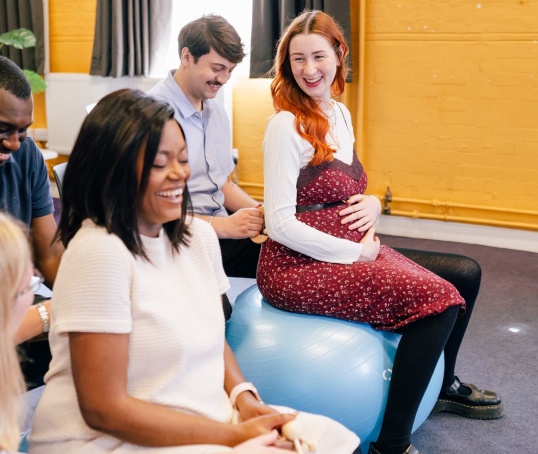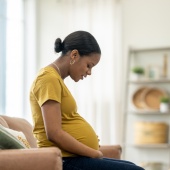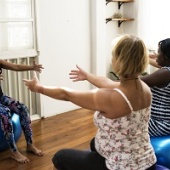Can exercise be continued during pregnancy? Are there any sports that should be avoided? Read more about staying fit and active during pregnancy.
Maintaining sport or exercise is a great way to stay healthy during pregnancy and beyond. It can help with maintaining a healthy weight in pregnancy and early parenthood, and may ease lower back pain (Liddle et al, 2015). As well as being good for the body, it is beneficial for mental health too.
If you are keeping up with your exercise routine or starting to get fit during pregnancy, there are a few things to know.
Why is it good to stay fit during pregnancy?
Exercising during pregnancy (Gov.uk, 2019; Muktabhant et al, 2015; NHS, 2023):
- improves fitness
- benefits mental health
- helps achieve and maintain a healthy weight
- reduces blood pressure
- helps prevent gestational diabetes
- improves sleep
- improves mood
- reduces problems in later pregnancy and birth
Exercise can also be social. A pregnancy-specific class, like pregnancy yoga, can be a good way to meet other expectant parents.
Could exercise harm the baby?
Most exercise is not dangerous for the baby (NHS, 2023). It might even help them get into a good position for labour (Swim England, no date).
How much exercise is best?
At least 150 minutes of moderate intensity exercise a week is recommended (Gov.uk, 2019). This is best broken up into different sessions and could include exercise such as swimming or dancing, but also going for a walk or doing some gentle stretching.
Is it ok to continue an exercise routine during pregnancy?
Yes, if a pregnant woman or person already exercises, it is usually safe to keep doing so. They can continue as long as they feel comfortable (NHS, 2023).
Is it ok to start a new exercise during pregnancy?
Starting a new exercise is also fine, and exercise doesn’t have to be hard work to be beneficial.
Beginning strenuous exercise for the first time isn’t advised in pregnancy. When starting any new fitness class, tell the instructor about the pregnancy (NHS, 2023).
Any general things to be aware of?
- Warm up and cool down before and after exercising (NHS, 2023).
- The effects of pregnancy can be surprising at first. Listen to the body, and adapt and slow down as the bump grows (Gov.uk, 2019).
- If it’s difficult to talk, it’s probably too strenuous (NHS, 2023).
- Keep hydrated while exercising by drinking as much water as you need. This is especially important in hot temperatures or when doing intense physical exercise (NHS, 2023; Xpert Fitness, no date).
- Don’t do strenuous exercise in hot weather (NHS, 2023).
- Don’t bump the bump. Be careful with exercises where there is a risk of falling. This includes cycling, skiing or horse riding (NHS, 2023).
- When a person is pregnant, their centre of gravity shifts. This means they should be extra careful with exercises that require balance (Vo, 2021; Xpert Fitness, no date).
- Inversions (turning upside down, for example in yoga or pole dancing) can be done if there are no pregnancy complications and while the pregnant person feels comfortable doing them (Vo, 2021; Xpert Fitness, no date).
Are there any sports to avoid?
Contact sports, which pose a risk of injury, aren't suitable during pregnancy. This includes judo, kickboxing, boxing or squash (NHS, 2023).
Avoid lying on the back for a long time during pregnancy, especially from 16 weeks (NHS, 2023; Xpert Fitness, no date). The weight of the bump can push down on the main blood vessel, causing faintness (NHS, 2023).
Scuba diving is risky for a baby during pregnancy. The baby could get decompression sickness or gas bubbles in the blood (NHS, 2023).
Unless they live at that level, a pregnant woman or person should avoid exercising at heights of 2,500 meters or more above sea level (NHS, 2023).
Which exercises are recommended during pregnancy?
Most sport or exercise can usually be continued during pregnancy while it is enjoyable. Some are particularly popular during pregnancy.
Swimming
Swimming is an excellent exercise for pregnancy. It can help women and pregnant people with a heavy bump. It supports up to 90% of a person's body weight (NHS, 2023; Swim England, no date).
It can also ease swelling in legs and feet and help sciatic pain. Some evidence suggests it helps the baby get into a good position for labour (Swim England, no date).
All strokes are suitable in early pregnancy. In late pregnancy, breaststroke might be most comfortable, and it also strengthens back and chest muscles (Swim England, no date).
Talk to your midwife or doctor before starting swimming if you had any pregnancy problems in this or a past pregnancy (Swim England, no date).
Yoga or Pilates
Yoga is a good way to stay healthy, strengthen the body and relax during pregnancy.
NCT has a selection of Yoga in pregnancy videos exclusively for parents doing our antenatal course. We also run Yoga for Pregnancy classes. Find one in your area.
Pilates can strengthen the core muscles and help with relaxation (Patient, 2022). Always check that an instructor is trained to support in pregnancy.
Walking
Walking is a safe, free way to be active that can be attempted anytime. It helps maintain a healthy weight during pregnancy and after birth. Half an hour or more a day is ideal, but it all helps (NHS, 2023).
Everyday ways to improve fitness
There are lots of ways to stay active without doing an exercise routine or sport. It’s helpful to include exercise in your daily routine. For example, walk short distances instead of driving. You can also climb stairs instead of taking the lift (NICE, 2010).
Aim to move as much as possible, and limit time sitting down at a computer or watching TV (NICE, 2010).
Reducing anxiety
Deep breathing or relaxation exercises might reduce anxiety or depression in a pregnant woman or person. They can be calming and easily fit into a normal routine (Patient, 2017).
Further information
Our NCT New Baby course supports new parents and their babies, giving you all the tools you need to make the transition to parenthood a little bit easier.
Gov.uk (2019) Physical activity for pregnant women (text of the infographic). https://www.gov.uk/government/publications/physical-activity-guidelines… [20 Nov 24]
Liddle SD, Pennick V. (2015) Interventions for preventing and treating low‐back and pelvic pain during pregnancy. Cochrane Database of Systematic Reviews, Issue 9. Art. No.: CD001139. https://doi.org/10.1002/14651858.CD001139.pub4
Muktabhant B, Lawrie TA, Lumbiganon P, Laopaiboon M. (2015) Diet or exercise, or both, for preventing excessive weight gain in pregnancy. Cochrane Database of Systematic Reviews, Issue 6. Art. No.: CD007145. https://doi.org/10.1002/14651858.CD007145.pub3
NHS (2023) Exercise in pregnancy. https://www.nhs.uk/pregnancy/keeping-well/exercise/ [20 Nov 24]
NICE (2010) Weight management before, during and after pregnancy [PH27]. https://www.nice.org.uk/guidance/ph27 [20 Nov 24]
Patient (2017) Relaxation exercises. https://patient.info/news-and-features/relaxation-exercises [20 Nov 24]
Patient (2022) Can Pilates help strengthen your pelvic floor during pregnancy? https://patient.info/news-and-features/can-pilates-help-strengthen-your… [20 Nov 24]
Swim England (No date) Swimming when pregnant. https://www.swimming.org/learntoswim/swimming-when-pregnant/ [20 Nov 24]
Vo J (2021) Pole during pregnancy. https://www.thepolephysio.com/post/pole-during-pregnancy [26 Nov 24]
Xpert fitness (No date) Training aerial and pole while pregnant. https://xpertfitness.com/training-aerial-pole-whilst-pregnant/ [26 Nov 24]







